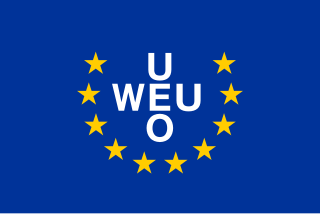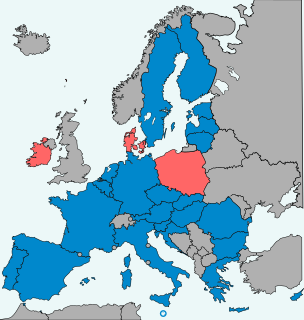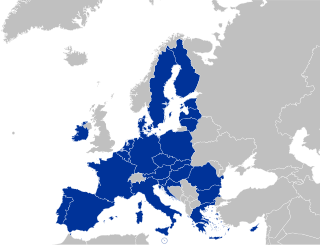Related Research Articles

The Treaty on European Union, commonly known as the Maastricht Treaty, is the foundation treaty of the European Union (EU). Concluded in 1992 between the then-twelve member states of the European Communities, it announced "a new stage in the process of European integration" chiefly in provisions for a shared European citizenship, for the eventual introduction of a single currency, and for common foreign and security policies. Although these were widely seen to presage a "federal Europe", the focus of constitutional debate shifted to the later 2007 Treaty of Lisbon. In the wake of the Eurozone debt crisis unfolding from 2009, the most enduring reference to the Maastricht Treaty has been to the rules of compliance – the "Maastricht criteria" – for the currency union.

The Western European Union was the international organisation and military alliance that succeeded the Western Union (WU) after the 1954 amendment of the 1948 Treaty of Brussels. The WEU implemented the Modified Brussels Treaty. During the Cold War, the Western Bloc included the WEU member states and the United States and Canada as part of the North Atlantic Treaty Organization (NATO).

The Treaty of Nice was signed by European leaders on 26 February 2001 and came into force on 1 February 2003.

The Common Foreign and Security Policy (CFSP) is the organised, agreed foreign policy of the European Union (EU) for mainly security and defence diplomacy and actions. CFSP deals only with a specific part of the EU's external relations, which domains include mainly Trade and Commercial Policy and other areas such as funding to third countries, etc. Decisions require unanimity among member states in the Council of the European Union, but once agreed, certain aspects can be further decided by qualified majority voting. Foreign policy is chaired and represented by the EU's High Representative, currently Josep Borrell.

Republican Sinn Féin or RSF is an Irish republican political party in Ireland. RSF claims to be heirs of the Sinn Féin party founded in 1905 and took its present form in 1986 following a split in Sinn Féin. RSF members take seats when elected to local government in the Republic of Ireland, but do not recognise the validity of the Partition of Ireland. It subsequently does not recognise the legitimacy of the parliaments of Northern Ireland (Stormont) or the Republic of Ireland, so the party does not register itself with them.
The Twenty-sixth Amendment of the Constitution Act 2002 is an amendment of the Constitution of Ireland which permitted the state to ratify the Treaty of Nice. It was approved by referendum on 19 October 2002 and signed into law on 7 November of the same year. The amendment followed a previous failed attempt to approve the Nice Treaty which was rejected in the first Nice referendum held in 2001.
Ireland has been neutral in international relations since the 1930s. The nature of Irish neutrality has varied over time, and has been contested since the 1970s. Historically, the state was a "non-belligerent" in the Second World War and has never joined NATO, although during the Cold War it was anti-communist and aloof from the Non-Aligned Movement. The compatibility of neutrality with Ireland's membership of the European Union has been a point of debate in EU treaty referendum campaigns since the 1990s. The Seville Declarations on the Treaty of Nice acknowledge Ireland's "traditional policy of military neutrality", reflecting the narrow formulation of successive Irish governments. Others define Irish neutrality more broadly, as having "a strong normative focus, with a commitment to development, United Nations peacekeeping, human rights and disarmament".

The Common Security and Defence Policy (CSDP) is the European Union's (EU) course of action in the fields of defence and crisis management, and a main component of the EU's Common Foreign and Security Policy (CFSP).
The Twenty-fourth Amendment of the Constitution Bill 2001 was a proposed amendment to the Constitution of Ireland to allow the state to ratify the Treaty of Nice of the European Union. The proposal was rejected in a referendum held in June 2001, sometimes referred to as the first Nice referendum. The referendum was held on the same day as referendums on the prohibition of the death penalty and on the ratification of the Rome Statute of the International Criminal Court, both of which were approved.

In general, the law of the European Union is valid in all of the twenty-seven European Union member states. However, occasionally member states negotiate certain opt-outs from legislation or treaties of the European Union, meaning they do not have to participate in certain policy areas. Currently, three states have such opt-outs: Denmark, Ireland and Poland. The United Kingdom had four opt-outs before leaving the Union.

The Twenty-eighth Amendment of the Constitution Bill 2008 was a proposed amendment to the Constitution of Ireland that was put to a referendum in 2008. The purpose of the proposed amendment was to allow the state to ratify the Treaty of Lisbon of the European Union.

The Twenty-eighth Amendment of the Constitution Act 2009 is an amendment of the Constitution of Ireland which permitted the state to ratify the Treaty of Lisbon of the European Union. It was approved by referendum on 2 October 2009.

The Treaty of Lisbon is an international agreement that amends the two treaties which form the constitutional basis of the European Union (EU). The Treaty of Lisbon, which was signed by the EU member states on 13 December 2007, entered into force on 1 December 2009. It amends the Maastricht Treaty (1992), known in updated form as the Treaty on European Union (2007) or TEU, as well as the Treaty of Rome (1957), known in updated form as the Treaty on the Functioning of the European Union (2007) or TFEU. It also amends the attached treaty protocols as well as the Treaty establishing the European Atomic Energy Community (EURATOM).

The Permanent Structured Cooperation (PESCO) is the part of the European Union's (EU) security and defence policy (CSDP) in which 25 of the 27 national armed forces pursue structural integration. Based on Article 42.6 and Protocol 10 of the Treaty on European Union, introduced by the Treaty of Lisbon in 2009, PESCO was first initiated in 2017. The initial integration within the PESCO format is a number of projects which launched in 2018.

The Treaties of the European Union are a set of international treaties between the European Union (EU) member states which sets out the EU's constitutional basis. They establish the various EU institutions together with their remit, procedures and objectives. The EU can only act within the competences granted to it through these treaties and amendment to the treaties requires the agreement and ratification of every single signatory.

Ireland and the North Atlantic Treaty Organization have had a formal relationship since 1999, when Ireland joined as a member of the NATO Partnership for Peace (PfP) program and signed up to NATO's Euro-Atlantic Partnership Council (EAPC). To date, Ireland has not sought to join as a full NATO member due to its traditional policy of military neutrality.

This article outlines the history of the Common Security and Defence Policy (CSDP) of the European Union (EU), a part of the Common Foreign and Security Policy (CFSP).
The Rome Declaration was the document signed at an extraordinary session held by the Council of Ministers of the Western European Union (WEU) in Rome on 26 and 27 October 1984 to mark the 30th anniversary of the Modified Brussels Treaty (MTB). The declaration decided to make better use of WEU to increase cooperation between the member states in the field of security policy, and reactivated the WEU.

The European Union (EU) and the North Atlantic Treaty Organisation (NATO) are two main treaty-based Western organisations for cooperation between member states, both headquartered in Brussels, Belgium. Their natures are different and they operate in different spheres: NATO is a purely intergovernmental organisation functioning as a military alliance whose primary task is to implement article 5 in the North Atlantic Treaty on collective territorial defence. The EU on the other hand is a partly supranational and partly intergovernmental sui generis entity akin to a confederation that entails wider economic and political integration. Unlike NATO, the EU pursues a foreign policy in its own right - based on consensus, and member states have equipped it with tools in the field of defence and crisis management; the Common Security and Defence Policy (CSDP) structure.
The European Union (EU) is an institution of its own kind consisting of member states being part of an alliance as well as military neutral member states while developing a Common Foreign and Security Policy for the union as a whole. The military neutral member states are Austria, Finland, Ireland, Malta and Sweden. Their membership in the EU and its Common Foreign and Security Policy poses a challenge for them to keep up their neutral status. This results from the obligation of the Common Foreign and Security Policy for the member states to provide it and the other member states with their solidarity as well as to stay coherent with the European foreign policy to not constrain its effectiveness. Thus, the problem is to stay coherent with the Common Foreign and Security Policy while still keeping a neutral position.
References
- ↑ "Statement on the Seville European Council, Dáil Éireann". Department of the Taoiseach. 2002. Retrieved 2009-02-13.
- ↑ "National Declaration by Ireland, 21 June 2002". Department of Foreign Affairs. 2002-06-21. Retrieved 2009-02-13.
- ↑ "National Declaration by Ireland at the Seville European Council". European Navigator. 2002-06-21. Retrieved 2009-02-13.
- ↑ "Department of Foreign Affairs - Declaration of the European Council, 21 June 2002". Eu2004.ie. Retrieved 2009-02-13.